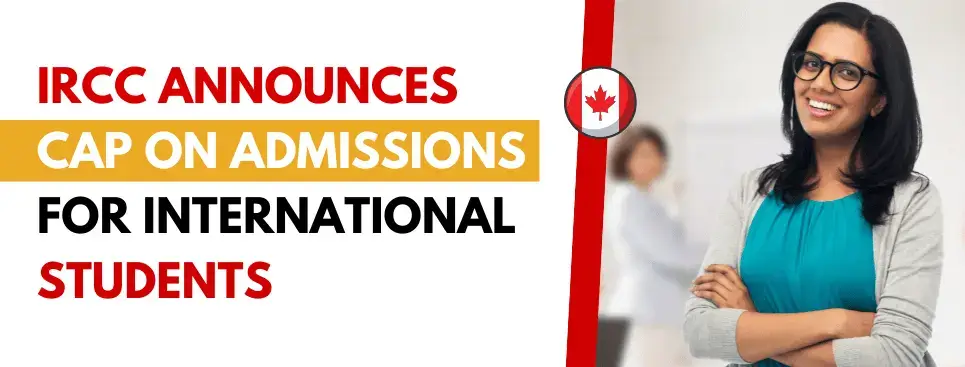International Student Visa in Canada: New Students Caps, PGWP Changes, and System Integrity Challenges
Big changes are afoot for international students looking to study in Canada. Immigration, Refugees and Citizenship Canada (IRCC) has announced a temporary cap on study permits, new eligibility criteria for Post-Graduation Work Permits (PGWPs), and a focus on strengthening system integrity.
Let's dive into the details and understand what these updates mean for you:
Study Permit Caps:
Fewer spots: IRCC is implementing a temporary cap on international student admissions for 2024, aiming for roughly 360,000 approved study permits – a 35% decrease from 2023.
Provincial variations: Each province and territory will have its own sub-cap, weighted by population. Expect significant reductions in provinces with rapid student growth.
No impact on current holders or renewals: This measure doesn't affect current study permit holders or renewals, and those pursuing master's or doctoral degrees are exempt.
Post-Graduation Work Permit (PGWP) Updates:

Curriculum loophole closed: Starting September 2024, students in programs under curriculum licensing agreements (private colleges teaching public college curriculums) won't be eligible for PGWPs due to concerns about program oversight.
Good news for masters students: Graduates of masters and other short graduate programs can now apply for a 3-year work permit, addressing limitations of the current system based on study program length.
Open work permits for spouses limited: Only spouses of masters and doctoral students will be eligible for open work permits. Those in undergraduate or college programs will no longer qualify.
TALK TO OUR STUDY VISA EXPERTS
Addressing System Integrity Concerns:
IRCC has been under pressure: The rising number of international students has raised concerns about system integrity, with Minister Miller citing issues like institutions prioritizing revenue over student success and the strain on services like housing and healthcare.
Doubled cost-of-living requirement: In December 2023, IRCC doubled the cost-of-living requirement for international students to $20,635 to better reflect reality.
Trusted Framework Agreement: IRCC plans to implement a Trusted Framework Agreement with designated learning institutions (DLIs) for expedited processing of study permits for eligible institutions.
MUST READ:
The Takeaway:
These changes reflect IRCC's efforts to manage Canada's international student program effectively, ensuring student well-being, program quality, and system integrity.
International students considering Canada should carefully research updated requirements, study permit caps, and program eligibility for PGWPs.
Remember, these are temporary measures, and IRCC will reassess the cap in 2025. Stay informed and plan accordingly to navigate this evolving landscape and pursue your study dreams in Canada.
Note: This content is based on official IRCC sources and verified information as of January 23, 2024. Please refer to the official IRCC website for the latest updates and details.
ALSO READ
10 Burning Questions International Students Have About Canada's New Visa & PGWP Rules:
1. Will I still be able to study in Canada if the cap is reached?
Yes, there's a good chance! While the overall number of study permits is decreasing, individual provinces still have flexibility within their allocated sub-caps.
Applying early and targeting provinces with less student growth can increase your odds. Remember, master's and doctoral programs are exempt from the cap altogether.
2. How do the new PGWP changes affect me?
If you're starting a program under a curriculum licensing agreement after September 2024, you won't be eligible for the PGWP.
However, the 3-year work permit for masters and short graduate programs is a fantastic new option! If you're unsure about your program's eligibility, contact the DLI directly.
3. What's the deal with the doubled cost-of-living requirement?
IRCC wants to ensure you're financially prepared for Canadian living. The new $20,635 requirement reflects the actual cost of living, including rent, food, and other essentials.
Make sure you budget accordingly and demonstrate sufficient financial resources in your study permit application.
4. Can I still bring my spouse to Canada as an international student?
Yes, but only if you're in a master's or doctoral program. Their open work permit access allows them to contribute financially and gain valuable Canadian work experience.
If you're in another program level, your spouse will need to explore alternative visa options like visitor visa or spousal sponsorship.
5. What can I do to improve my chances of getting a study permit under the new cap?
Apply early: Don't wait until the last minute! Processing times may be longer due to the cap, so submit your application well in advance of your desired start date.
Choose your program and institution wisely: Research programs with strong reputations and good track records with international students. Targeting provinces with lower application volumes can also be beneficial.
Meet all eligibility requirements: Ensure you have the necessary academic qualifications, language proficiency, and financial resources to support your studies in Canada.
Prepare a compelling application: Present a clear and concise study plan, and demonstrate your genuine interest in the program and your future goals in Canada.
6. Where can I find the latest information about these changes?
IRCC's official website is your best resource for up-to-date information on study permits, PGWPs, and other immigration policies. You can also contact an immigration consultant or lawyer for personalized guidance.
7. Will these changes stay in place forever?
No, the study permit cap is a temporary measure, and IRCC will reassess it in 2025.
The PGWP changes and cost-of-living requirements are likely to remain for the foreseeable future.
8. I'm already in Canada studying. Do these changes affect me?
No, not directly! If you already hold a valid study permit and are enrolled in a program, you're unaffected by the new cap and most PGWP changes.
You can continue your studies, graduate, and apply for the PGWP under the existing criteria as long as you meet the requirements.
However, the increased cost-of-living requirement applies to everyone, so ensure you have sufficient financial resources.
9. What if I applied for a study permit before the cap announcement?
Congratulations! If you submitted your application before January 22, 2024, the cap doesn't apply to you. Your application will be processed as per the previous policies.
Breathe easy and focus on preparing for your exciting Canadian adventure.
10. I'm worried about housing and healthcare with so many international students. What can I do?
You're right to be concerned. The rapid influx of students has challenged resources like housing and healthcare.
Here are some proactive steps:
Start housing and healthcare research early: Explore diverse housing options (campus residences, shared apartments, student rentals) and familiarize yourself with local healthcare services. Secure resources before arriving in Canada.
Stay informed about local resources: Many universities and colleges offer student support services that can guide you towards affordable housing and healthcare options. Utilize these resources actively.
Budget appropriately: Factor in potential healthcare costs (insurance, medication) and rent fluctuations when calculating your financial resources. Prepare for contingencies to ensure your well-being in Canada.
Remember, adaptability and resourcefulness are key to thriving in a new environment. By planning and seeking support, you can navigate the changing landscape and enjoy your Canadian studies without undue stress.
TALK TO OUR STUDY VISA EXPERTS
For more information related to a Study visa or any other visa Call or WhatsApp: +91 859 574 4633 or Email: [email protected]
Comments
